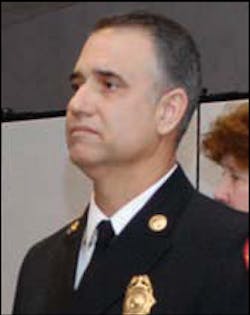When Miami-Dade Captain Abel Fernandez responded to a April 30, 2007 multi-vehicle crash, what began as an ordinary call quickly turned into something much more.
Arriving on the ladder truck that was the first unit on the scene, Fernandez sized it up the situation, took command and began to request additional resources.
The female diver of a silver Honda had lost control, crossed the median of Okeechobee Road in Hialeah Gardens, Fla. and hit two other cars before crashing into a concrete wall.
Crews began assisting the driver, who was ejected from the vehicle. She was soon transported to Jackson Memorial Hospital, where she was later pronounced dead. There was also a man trapped in one of the vehicles that was hit. He would survive.
Amid the commotion, Fernandez was told that a baby had been ejected during the collision and was thrown into the nearby Okeechobee Canal.
Since all hands were committed to assisting the victims, Fernandez transferred command back to officer on the aerial truck and threw on SCUBA pack over his uniform with the assistance of citizens on the scene.
Fernandez had been a diver for eight years but had mainly helped with body recoveries and assisting other divers at the scene. This time he was on his own.
"Obviously, anytime you're notified it's a child who's hurt; your adrenaline increases two-fold," he said. "Safety, even though it was paramount, in this case was secondary."
He said the canal is very polluted and was a body of water he would not normally dive in. "I would have never gone into that canal unless it was a life in peril," he said.
"As I was going along the bottom, I could see a shadow. At first thought it was a mannequin. I was looking for a baby, but found an adult."
As he was coming up, Fernandez grabbed the woman and was pulled up by a citizen monitoring his rope.
Crews began assisting the victim, who was pronounced dead at the scene.
After Fernandez shedded the SCUBA gear, he stayed in his wet clothes and became the medical group leader.
"This is not what we were responding on, we were responding to a routine car crash," he said. "It was a lot of things going on for a long time."
Looking back on the incident, he said, "It wasn't your normal call where you know you're going in for the woman. I didn't have any time to size up everything. It definitely wasn't your average call."






